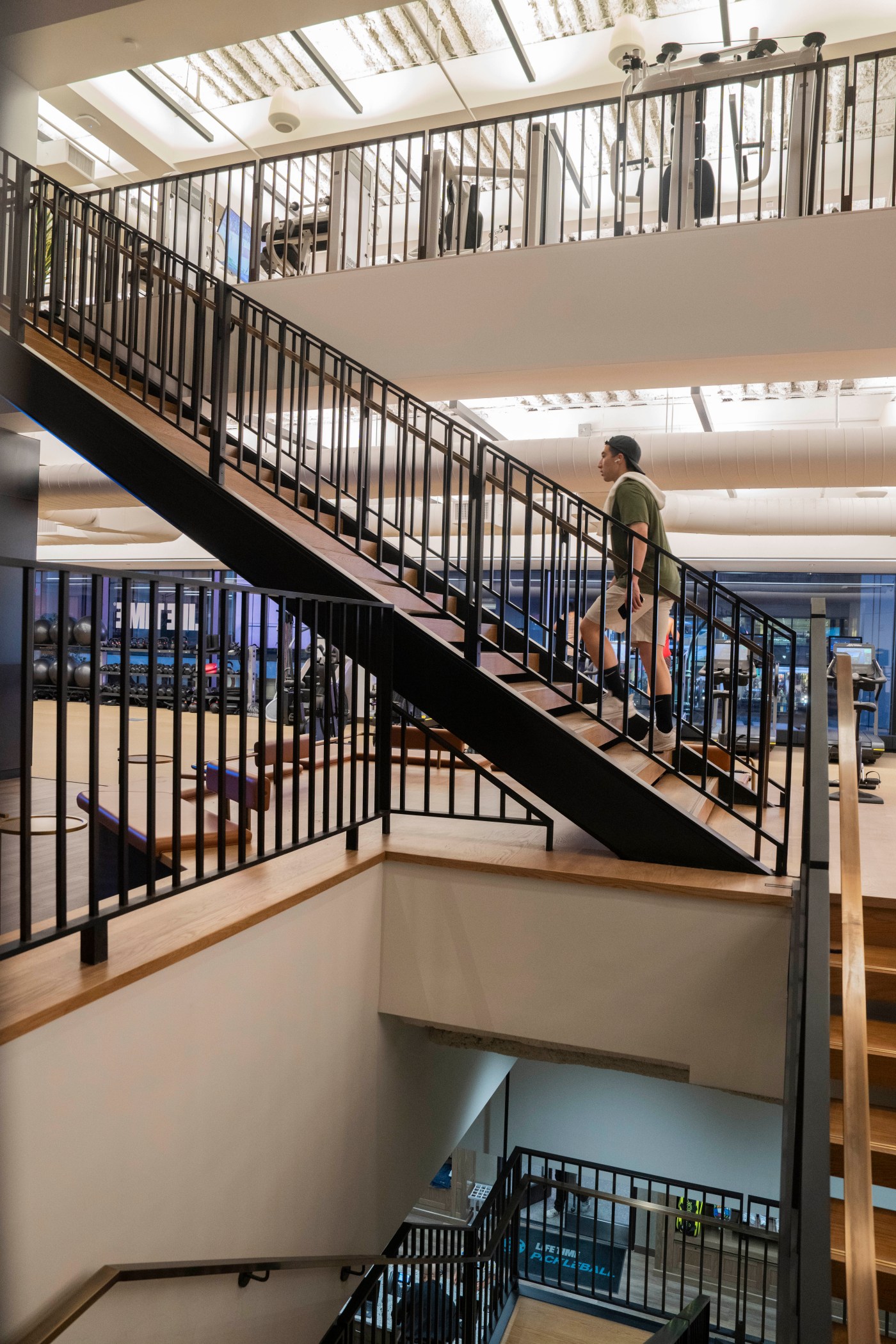
Child care, cafes, Herman Miller desks: It’s not your average gym anymore
High-end gyms are no longer just places to sweat it out.
The most exclusive ones offer not only state-of-the-art equipment, exercise classes and spacious locker rooms with cold eucalyptus-scented towels and fancy soaps but also “third places,” locations outside home and work where people can mingle and socialize. That means gyms are now also recreational centers and event spaces, salons and spas, hotels and workspaces. And they’re child care facilities.
At Chelsea Piers in New York, the sports and entertainment complex along the Hudson River, members can get work done before, in between or after workouts at the gym’s lounge and coworking space, which opens up to a 44-foot ceiling and waterfront view. The gym also hosts events, such as author talks and creative classes and workshops, for members.
At Life Time, a gym chain headquartered in Chanhassen that calls its branches a “country club” version of a health club, members can drop off their child before a workout for a fee and can get a private office or a dedicated Herman Miller desk at locations with coworking space, called Life Time Work.
People working near pickleball courts on the first floor at Life Time, a luxury gym at Pennsylvania Plaza in Midtown, New York, Thursday, June 12, 2024. High-end gyms, many of which used to be an amenity, are now the star attraction, offering hotel rooms and workspaces as part of their appeal. They’ve also gotten a lot bigger. (Hiroko Masuike/The New York Times)
A Life Time Work membership, available at their St. Louis Park, Edina and downtown Minneapolis locations in the Twin Cities, includes gym access and will cost you a couple of hundred dollars to thousands per month, depending on what kind of workspace you want and the location.
Gyms, many of which used to be an amenity attached to a hotel or an office building, have now become the star attraction, offering hotel rooms and workspaces as part of their appeal. These kinds of amenities require a lot of space — and a shaky commercial real estate sector with high vacancies has opened up opportunities for big gyms.
Gym facilities have a history of occupying unused properties and spaces. They can extend into spaces not traditionally desirable in the real estate world, using windowless rooms below street level as locker rooms or spaces for group exercise classes. Chelsea Piers took advantage of unused piers on the west side of Manhattan to build its 150,000-square-feet flagship complex in 1995, equipped with a six-lane, 75-foot pool; a rock wall; and three basketball courts.
Life Time Work
Life Time started in Minnesota in 1992 and now has 1.4 million paying members and over 200 locations across the country, mostly in the suburbs. It took over 54,000 square feet at its Penn 1 location in midtown Manhattan, more than enough space for its seven pickleball courts and cafelike seating area and bar, where members can have beers and other beverages on tap and watch one another play. Its other New York locations average about 41,000 square feet. Its first Life Time Work in New York is coming next year to the Brooklyn Tower, which will also offer a 110,000-square-foot space to sweat it out.
The pricing for the upcoming New York space has not yet been determined, but the Life Time Work in downtown Minneapolis charges $249 for a lounge membership, $500 for a desk and $1,278 for a private office. A Chelsea Piers membership starts at $220 per month in New York; the company declined to share its membership numbers.
Related Articles
Business People: Eagan attorney Alex Webb wins Army Corps of Engineers award
Real World Economics: Righting the ship when things go awry
Your Money: Is your asset allocation applicable to today’s markets?
Working Strategies: Land or Launch: Should 20 somethings be living at home?
Minnesota loses 8,600 net jobs in May, unemployment rises to 2.8%
Long leases, smaller staff
Life Time and Chelsea Piers can get these big spaces in large part because they sign leases lasting 20 to 25 years, with options to extend at the end of their agreement term. Most commercial leases in New York are five to 15 years, and office leases can be as long as 10 years.
“When you start to see these really long lease terms or ones with extension options built into it, it’s because the developer pays some big fixed costs upfront,” said Cameron LaPoint, an assistant professor of finance at Yale School of Management. “They’re trying to mold the property in a bespoke way to the tenant.”
Life Time’s CEO, Bahram Akradi, said the company’s strategy was to “try to control 40, 50 years” in its existing spaces.
To make their vision work, Life Time reduced its corporate office staff during the pandemic and eliminated sales positions and member promotions, allowing the clubs’ amenities to speak for themselves, Akradi said.
Locker room on the third floor at Life Time, a luxury gym at Pennsylvania Plaza in Midtown, New York, Thursday, June 12, 2024. High-end gyms, many of which used to be an amenity, are now the star attraction, offering hotel rooms and workspaces as part of their appeal. They’ve also gotten a lot bigger. (Hiroko Masuike/The New York Times)
Life Time and other high-end gyms have rebounded after hard times during the pandemic when membership rates plummeted and 25% of all health clubs and studios closed in 2021, according to industry group National Health & Fitness Alliance.
Whether developers will continue spending big on gyms, however, is hard to predict, LaPoint said, especially with leases extending decades into the future. One area of concern is stubborn inflation, said Chris Hudgins, a research analyst at S&P Global Market Intelligence. He pointed to high membership fees as potential pain points.
But for Akradi, business was going so well that “when you look at our 2024 and 2025 numbers,” referring to membership rates and sales from in-gym purchases, it would seem the pandemic “never happened.”
“We reinvented the business during that time, and it is substantially better than it used to be,” he said.
Related Articles
Business People: Eagan attorney Alex Webb wins Army Corps of Engineers award
Real World Economics: Righting the ship when things go awry
Your Money: Is your asset allocation applicable to today’s markets?
Working Strategies: Land or Launch: Should 20 somethings be living at home?
Minnesota loses 8,600 net jobs in May, unemployment rises to 2.8%

